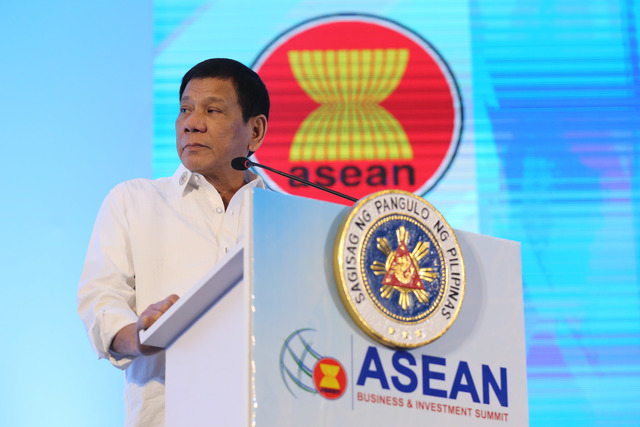
A visiting Chinese official said the Philippines has an important role to play in the China-led Regional Comprehensive Economic Partnership (RCEP), particularly in improving regional cooperation, as the country chairs the Asean this year.
Vice Premier Wang Yang, in a recent meeting with Duterte Cabinet officials led by Finance Secretary Carlos G. Dominguez III in Davao City, said China considers the Asean a diplomatic priority and that the Philippines, being its chair this year, can make a bigger contribution in terms of improving regional cooperation.
“Secretary Dominguez responded that, together with China, the Asean can lead growth in the regional economic front that is not only a rapid one but inclusive to all members of society,” the Department of Finance (DOF) said in a statement.
According to the DOF, the finance chief shared the Duterte administration’s optimism on the early conclusion of the talks on the China-led RCEP during the meeting, while Wang cited the Philippines’s irreplaceable role in the discussions of RCEP and highlighted that “Asean centrality” will be crucial in the conclusion of the agreement.
“We look forward to continue the discussions on the promotion of free-trade partnership via the RCEP where China is also taking the lead. We are very much optimistic for its early conclusion, which would help us further diversify our export markets,” Dominguez said.
Wang expressed China’s support for the Philippines’s chairmanship of the Asean, which is commemorating its 50th anniversary this year.
The RCEP negotiations started in November 2012 involving leaders from the 10 Asean members (Brunei Darussalam, Cambodia, Indonesia, Laos PDR, Malaysia, Myanmar, the Philippines, Singapore, Thailand and Vietnam) with six free-trade partners, namely, Australia, China, India, Japan, South Korea and New Zealand.
The 16 Asian countries account for almost half of the world’s population, almost 30 percent of global GDP and over a quarter of world exports. Total world population as of March 2017 is estimated at 7.5 billion, according to the recent United Nations estimates.
The RCEP covers trade in goods and services, investment, economic and technical cooperation, intellectual property rights, competition policy and dispute settlement, among other issues. It does not cover labor, environment and state-owned enterprises.
Earlier, Dominguez said the Duterte administration’s move toward greater integration with other Asian economies would lead to substantial investment inflows this year, as well as rapid tourism growth and robust exports that would benefit not only big businesses but micro and small enterprises.
“The stronger linkages we now forge with our development partners and regional neighbors will provide new drivers for the growth of our domestic economy,” Dominguez added.
Also present during the Davao meeting were Minister Fu Ziying, China international trade representative and vice minister of the Ministry of Commerce; Ambassador Zhao Jianhua of the Embassy of China in Manila; Deputy Secretary-General Jiang Zelin of the State Council; Vice Minister Liu Zhenmin of the Ministry of Foreign Affairs; and Vice Minister Wang Xiaotao of the National Development and Reform Commission.
Source: Business Mirror
Share: